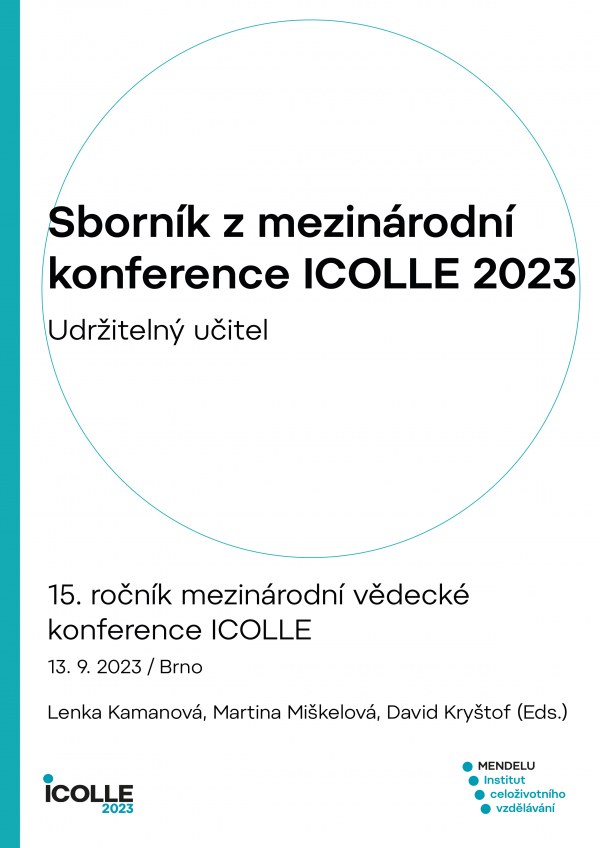
DOI: 10.11118/978-80-7509-958-7-0031
FINANČNÍ GRAMOTNOST JAKO JEDNA Z KLÍČOVÝCH KOMPETENCÍ UDRŽITELNÉHO ŠKOLSTVÍ
- Hana Filipczyková
Financial literacy of the population is one of the areas that has a great social impact. A financially literate person is informed about finances, can manage his/her own or his/her family‘s budget and manage his/her income and expenditure in changing life situations. Financial literacy should be understood as the contribution of financial education at the societal and individual levels, which are intertwined. For this reason, it is necessary to apply the elementary basics of financial literacy from primary school onwards. On 13 January 2020, the Government of the Czech Republic approved the National Strategy for Financial Education 2.0. The aim of the new strategy is to create conditions for a long-term increase in the level of financial literacy of the Czech population. The issue of financial literacy has therefore been included as part of the framework educational programmes of primary and secondary schools. Unfortunately, we are encountering a fundamental problem here, namely a situation where family budgets are managed by adults who did not discuss financial literacy issues during their schooling or were introduced to them in a different social context. And this situation sometimes also applies to some teachers, especially in primary schools, who are experts in their field but are not very familiar with financial literacy issues. Therefore, financial education needs to be expanded in this area as well. The aim of the article is to evaluate the financial education of pupils and teachers in selected primary schools in the Moravian-Silesian Region and to propose changes that would strengthen the level of this education. In order to achieve the goal, a qualitative research strategy is chosen, the method of data collection is a structured interview with open questions. The guided interview for the purpose of this research includes 6 questions related to the current level of financial education of students and teachers. The collected data is then subjected to analysis, based on which the predetermined hypotheses are confirmed or refuted. The research sample consists of principals or their representatives from 15 primary schools in the Moravian-Silesian Region. The research was conducted during May to June 2023. In relation to the main research objective, the following sub-research objectives were defined: 1) To assess the current level of financial education in primary schools. 2) To evaluate the advantages and disadvantages of financial education in primary education after the introduction of financial literacy standard. The research findings should confirm or refute the following hypotheses: Hypothesis 1: The effect of introducing the financial literacy standard into the education curriculum is to increase the level of financial literacy of both students and teachers in primary schools. Hypothesis 2: The application of the National Strategy for Financial Education 2.0 to the teaching process in primary schools contributes to a long-term increase in the level of financial literacy in the Czech Republic.
Keywords: financial literacy, financial education, strategy for financial education, financial literacy standard, primary school, qualitative research strategy
pages: 31-42, online: 2023
References
- Bertl, I. & kol. (2017). Finanční gramotnost jako nástroj sociální adaptace a příležitost k překonání negativních důsledků sociálních problémů: tipy a podněty do výuky. Praha: Česká andragogická společnost.
- Hendl, J. (2005). Kvalitativní výzkum: základy metody a aplikace. Praha: Portál.
- Lichtenberková, K. & kol. (2022). Jak učit finanční gramotnost?: tipy a podněty do výuky. Praha: Portál.
- Miovský, M. (2006). Kvalitativní přístup a metody v psychologickém výzkumu. Praha: Grada Publishing.
- Národní strategie finančního vzdělávání 2.0 [online]. 2019 [cit. 2023-09-09]. Dostupné z: https://financnigramotnost.mfcr.cz/cs/pro-odborniky/strategicke-dokumenty#strategie-2.0
- Navrátilová, P. & kol. (2013) Finanční gramotnost: tipy a podněty do výuky. Prostějov: Computer Media.
- Ševčík, K. & Janko, T. (2017). Komparativní analýza standardů finanční gramotnosti v České republice a ve vybraných zahraničních státech. Orbis Scholae, 11(2), 11-29.
 Go to original source...
Go to original source... - Škvára, M. (2011). Finanční gramotnost. Praha: Miroslav Škvára.


